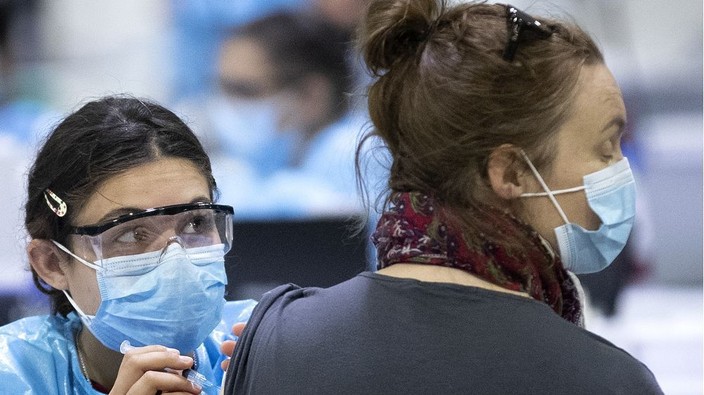vaccines were developed in miraculously short periods of time to combat a new strain of coronavirus that was infecting and injuring or killing millions of people.canada has
approved four vaccines: the single-dose johnson & johson vaccine which was
never distributed; the astrazeneca vaccine, which was largely used in early vaccination efforts; and two mrna vaccines made by pfizer and moderna. the mrna vaccines have dominated vaccinations in canada and many other countries due to higher efficacy in preventing infection and the presence of fewer side effects such as blood clotting complications.
how vaccines provide protection
vaccines provide protection from infection by stimulating antibodies that bind to the virus and block entry into cells thus restricting viral replication. the amount of antibody production and its rate of decay can be measured by a simple blood test. memory t cells are also produced that are primed to remember the viral spike protein and fight off future attack. this protective immunity is harder to measure or determine its residual level of protection as antibody levels fall.
why is immunity decreasing?
the mrna vaccines were about 95 per cent protective against the original sars-cov-2 strain and about 88 per cent against the
alpha variant of concern (voc) first described in the u.k. mutations in the spike protein of the virus meant that antibodies developed to target the original virus were not as specific and thus not quite as effective.the spread of further vocs with more spike protein mutations, primarily the much more contagious delta variant, meant higher antibody levels were needed to fight the virus and prevent it from causing serious infection.thus it is not surprising that the combination of antibodies produced being less effective and their natural decay over time has led to small but increasing rates of infection in fully vaccinated people. while the all important protection from life threatening infection has remained very high after vaccination, this immunity is also starting to be pierced more frequently. as expected, breakthrough infections are occurring most commonly in people with initial low antibody production or higher rates of antibody decay.the needed solution to waning immunity is booster shots, either with a third dose of the original vaccine available now, or with shots being developed that more specifically target the spike protein mutation of the voc.given the highly contagious nature of the dominant delta variant and a residual pool of unvaccinated people, especially children, we are at increasing risk and need a detailed plan for boosters very soon. the key issue is what the priorities and timelines for the booster shot are and how prepared is canada to source and administer them. we can’t be caught as flat-footed as we were for the delayed initial vaccination program.
lessons from israel and the u.s.
israel and the u.s. started their vaccination program much earlier than canada and have important lessons about earlier waning immunity and the benefits of giving booster shots.u.s. president joe biden
announced that as of september 20, all individuals who are eight months or longer past their second shot will be eligible for vaccination. the fda and the cdc advisory committee on immunization practices still need to authorize this move. the groups are reviewing the data on breakthrough infections and safety of a third dose. it is highly likely that they will approve third shots soon.
israel is being far more aggressive in
giving booster shots based on their data about waning immunity due to the delta variant and the renewed benefit of a third shot. an israeli health ministry study
published in july showed a dramatic reduction of the pfizer vaccine’s efficacy against infection to only 39 per cent between june 20 and july 17. protection against severe illness, a key benefit, dropped from an earlier 97 per cent to 81 per cent. a
study done by the maccabi health system showed that about 150,000 people aged over 60 who received a third pfizer shot had about an 86 per cent reduction in infection compared to a matched group only receiving two shots. as a result, israel is now offering boosters to people 30 and over after only five months of vaccination.
lessons for canada
we have already started to offer boosters for those who are seriously immune compromised. most of our population received their second shot less than six months ago since we went for a first shot fast approach. thus we now have a little more time to offer boosters but it is essential that we have a rapidly deployable plan in place since we will need them soon. the priorities for who should receive a booster should be similar to what determined priority for initial vaccination.we need to offer boosters now to patient-facing health care workers who were generally vaccinated early, many of whom now have fading immunity as the fourth wave puts them at increasing personal risk. those over 70 are also at higher risk due to generally lower initial antibody production and earlier decay below protective levels. we should offer early booster shots to those over 80 and those living in congregate facilities.antibody levels don’t tell the whole story and we don’t have enough data to determine precisely below what level is unsafe. there are at least five different commercial antibody tests with different test values making precision about what level is safe more difficult. decisions will therefore be made based on at-risk populations for infection and bad outcomes. we know who was at greatest risk before vaccination and the same staggered priority will likely be appropriate for determining the timing of a booster shot.we don’t fully know the risks of booster shots but they are likely small. their value in younger people is yet to be defined. further israeli data will likely guide our decisions. the benefit for those over 60 seems very likely to exceed any projected risk given that this group had the most deaths from infection.boosters are a political problem for our current government which is campaigning on having solved the problem of covid-19 by widespread vaccination. it is easy to ignore and hide behind overly cautious opinions until after the september 20 election.what we need from our federal and provincial governments is an acknowledgment of the risk, information on procurement of adequate amounts of booster shots and a plan for efficient delivery. for once it would be nice to be ahead of the curve rather than swamped by a wave of predictable and avoidable illness.
 5 minute read
5 minute read









